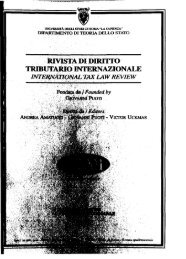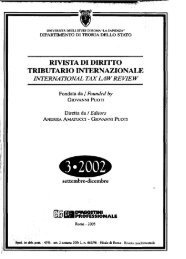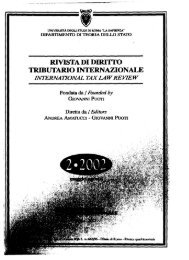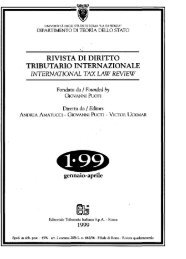RIVISTA DI DIRITTO TRIBUTARIO INTERNAZIONALE - Rdti.it
RIVISTA DI DIRITTO TRIBUTARIO INTERNAZIONALE - Rdti.it
RIVISTA DI DIRITTO TRIBUTARIO INTERNAZIONALE - Rdti.it
Create successful ePaper yourself
Turn your PDF publications into a flip-book with our unique Google optimized e-Paper software.
Sezione I - Dottrina<br />
In conclusion, from the brief overview of employment and tax legislation<br />
in other countries, <strong>it</strong> emerges that even in these countries there exists<br />
a third type of work contract which cannot be qualified e<strong>it</strong>her as subordinated<br />
employment or as self employment work.<br />
The need for this third type of work contract is felt more acutely in<br />
the field of employment law than <strong>it</strong> is in the field of tax law, both w<strong>it</strong>hin<br />
Germany and Uinetd Kingdom.<br />
The need from a substantive point of view for a third type of work<br />
contract in the field of tax law can be inferred from certain income tax<br />
legislation passed both in the Germany and in Spain.<br />
9. Co-ordinated and continuous collaboration contracts; the model<br />
OECD treaty on double taxation<br />
The model OECD treaty on double taxation deals both w<strong>it</strong>h se!f employment<br />
work carried out by "independent professionals" and w<strong>it</strong>h subordinated<br />
employment contracts (article 14 and 15). It refers, on the one<br />
hand, to the concept of the "independence" of certain professions and, on<br />
the other hand, <strong>it</strong> sets out some examples of income from subordinated<br />
employment. I 19'<br />
The mode! treaty being examined here, does not set forth, therefore,<br />
a provision of a generaI nature in co-ordinated and continuous colla boration<br />
contracts.<br />
Such an omission, according to some seems have been èetermined<br />
by the intention to privilege the structural aspect of the work activ<strong>it</strong>y, in<br />
order to avoid references to complex cases, such as, for example, nonsubordinated<br />
employment contracts (73).<br />
The OECD model. dedicates, therefore, particular attention to some<br />
of the typical cases of co-ordinated and continuous collaboration contracts,<br />
having regard, respectively to articles 16 and 17 on remuneration<br />
and fees of company directors and income from sporting activ<strong>it</strong>ies.<br />
It seems to divide income from se!f employment work into three subcategories.<br />
By virtue of this provision the income generated from carrying out<br />
the offices of company director shall be taxed in the country of residence<br />
of such company.<br />
(73) Thus, G. Puoti, Incorne from employment contracts in OECD Cornmentary,<br />
in International Tax Law Manual, ed<strong>it</strong>ed by V. Uckrnar. Cedam, 1999, p. 331.<br />
<strong>RIVISTA</strong> <strong>DI</strong> DlRfTID <strong>TRIBUTARIO</strong> IN1ERNAZIONALE 3/2001






